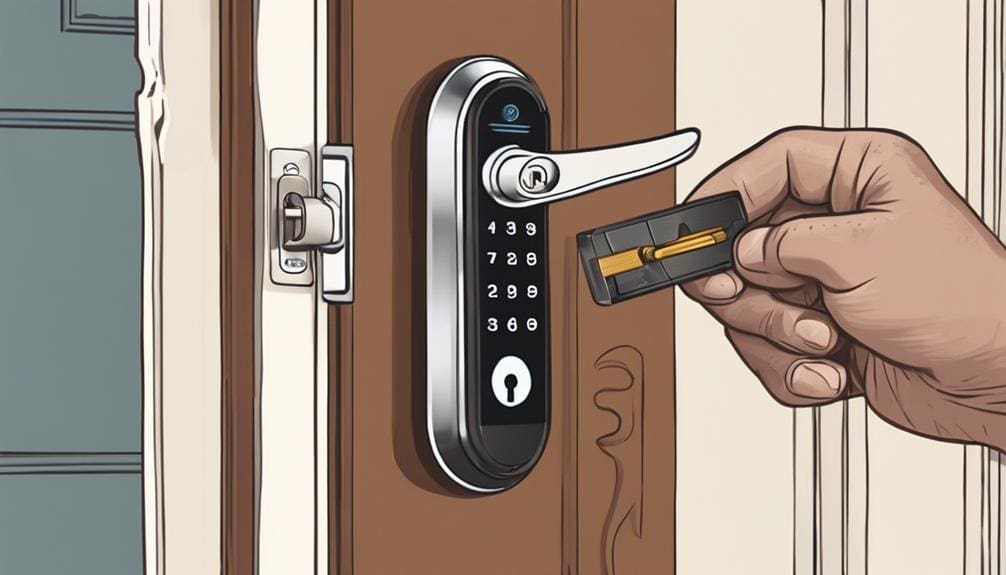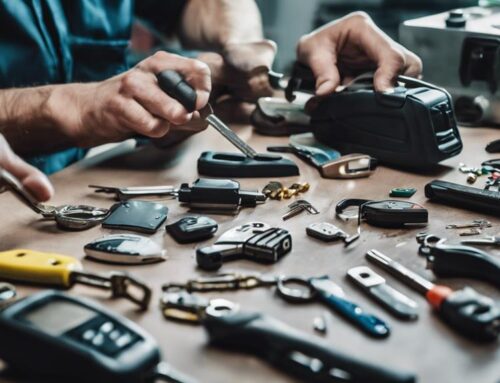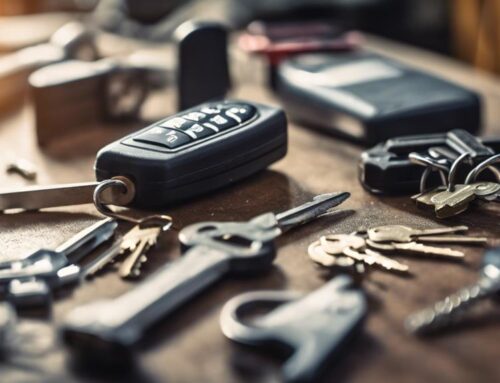Yes, a professional locksmith can install a smart lock system in your home. They make sure the lock integrates seamlessly with your current security setup, handling all complexities of installation and configuration. They’ll also guide you through installing necessary apps, setting up access codes, and configuring WiFi or Bluetooth connectivity. Hiring a locksmith maximizes the lock’s functionality, reliability, and security features. Smart locks offer benefits like keyless entry, remote access, and real-time activity monitoring. Installation costs typically range from $100 to $200, depending on various factors. For thorough insights into what the installation process entails, there’s more to uncover.
Key Takeaways
- Yes, a professional locksmith can install a smart lock system in your home.
- Locksmiths ensure proper installation and configuration for maximizing the smart lock’s security features.
- They can integrate the smart lock with your existing home security setup.
- Costs for installation typically range from $100 to $200, depending on complexity and location.
- Professional locksmiths can troubleshoot and ensure seamless connectivity with smart home devices.
Understanding Smart Lock Systems
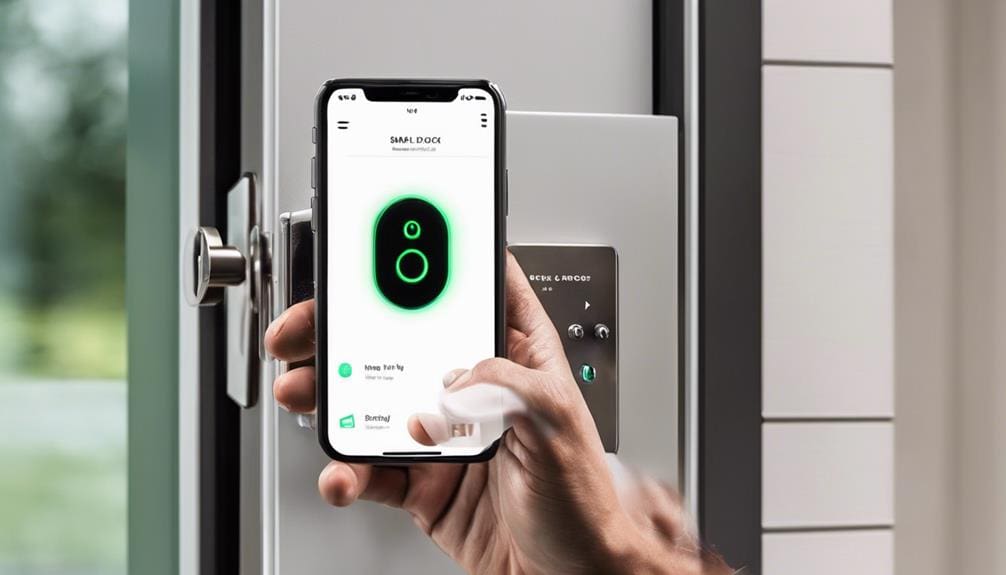
Understanding intelligent lock systems is vital for guaranteeing that your home benefits from their advanced security and convenience features. You’ll find various intelligent lock brands, each offering unique security features and compatibility with smart home devices. When considering installation, it’s important to engage a professional locksmith who’s experienced in handling these technologies. They’ll ensure that the intelligent lock is installed correctly and configured to maximize security features. These experts can guide you through selecting the right brand, understanding its features, and maintaining the system effectively. Professional locksmiths also guarantee that your intelligent lock system integrates seamlessly with your existing home security setup, providing you with peace of mind and optimal functionality.
Benefits of Installing Smart Locks
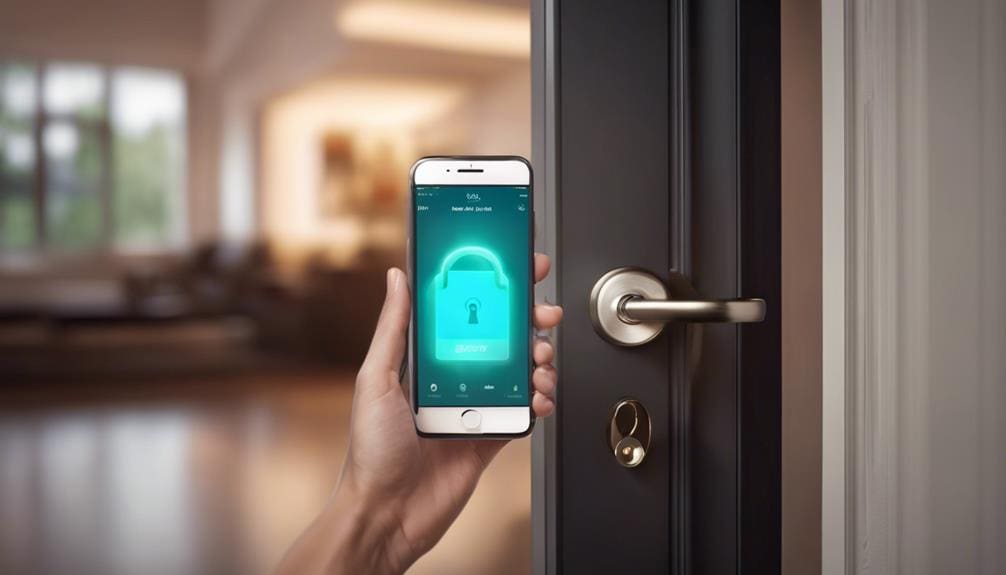
Smart locks offer significant benefits, such as keyless entry, enhanced security features, and seamless integration with smart home systems. By installing smart locks, you eliminate the hassle of traditional keys, providing you with convenience and flexibility. The advanced security technology embedded in smart locks allows for remote access control and real-time activity monitoring, giving you greater peace of mind. When you choose a locksmith to install these smart systems, you ensure professional setup, which maximizes their functionality and reliability. Moreover, smart locks integrate effortlessly with your existing smart home systems, enabling automated routines and streamlined control. This combination of convenience, enhanced security, and professional installation makes smart locks an excellent choice for modern home security.
Choosing the Right Smart Lock
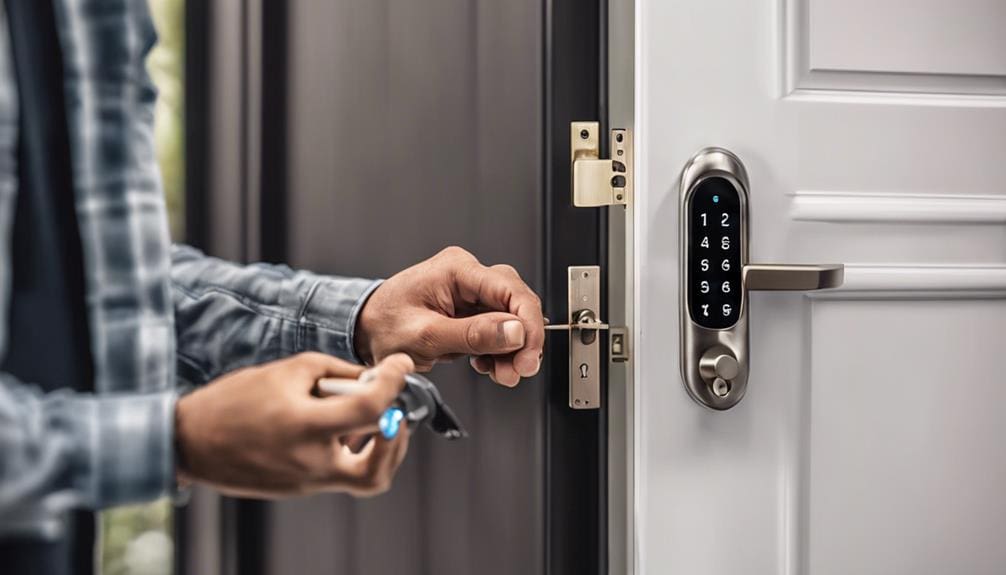
When selecting the appropriate smart lock, make sure it’s compatible with your current door hardware to avoid installation issues. Prioritize models with strong security features like encryption and tamper alerts to enhance safety. Additionally, consider the power source options, including battery life and ease of replacement, to maintain uninterrupted functionality.
Evaluate Compatibility Factors
Evaluating compatibility factors is important as you need to make certain that the smart lock system fits your door type and integrates seamlessly with your existing hardware. When installing a smart lock, consider access control and security aspects to guarantee peak performance. Check if the smart lock is compatible with your door’s thickness and existing deadbolt setup. Evaluate power source options, such as battery-powered or hardwired, to match your maintenance preferences. Additionally, ensure the smart lock aligns with your smartphone’s operating system for seamless integration. Research brands for usability features like remote access and alerts. Proper evaluation of these factors will streamline the smart lock installation process and enhance your home’s security.
Identify Key Security Features
Choosing the right smart lock requires you to prioritize key security features like encryption, tamper alerts, and biometric authentication to guarantee robust home protection. Focus on these essential aspects to guarantee maximum security and convenience:
- Encryption: Guarantee the smart lock uses advanced encryption to protect data transmission, safeguarding your keyless entry system from hacking attempts.
- Tamper Alerts: Opt for smart locks that provide real-time notifications of any unauthorized attempts, enhancing your awareness and immediate response.
- Biometric Authentication: Choose models with fingerprint or facial recognition for an additional layer of security, making unauthorized access nearly impossible.
Additionally, consider smart locks with remote access capabilities, allowing you to control entry points via smartphone or app, enhancing both security and convenience from anywhere.
Consider Power Source Options
After identifying key security features, consider the available power source options to guarantee your smart lock system functions reliably and suits your home’s infrastructure. Battery-powered smart locks offer a convenient solution, especially if your home lacks hardwiring capabilities. These locks are easy to install and maintain, but keep in mind you’ll need to replace batteries periodically. Alternatively, hardwired smart locks provide a more permanent solution, eliminating the need for battery replacements. This option, however, may require professional installation to guarantee proper integration with your existing door hardware and electrical system. Consult with a locksmith to assess your home’s setup and determine the most suitable power source option, ensuring your install smart lock system meets your needs effectively.
Pre-Installation Considerations
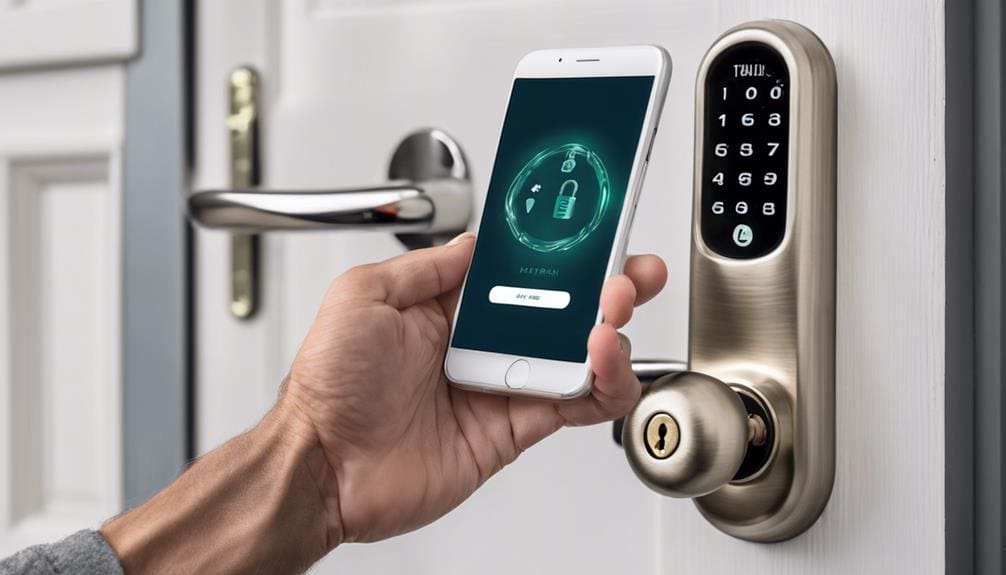
When planning to install a smart lock system, it is crucial to first consider the connection type—whether WiFi or Bluetooth—and your preferred power source. Evaluating these factors will help you understand what is optimal for your smart home security. Here are three key pre-installation considerations:
- Compatibility: Confirm that the smart lock is compatible with your current door hardware and features encryption and tamper alerts.
- Usability Features: Explore different brands for usability features such as remote access, activity monitoring, and keyless entry convenience.
- Professional Help: While a DIY installation is tempting, selecting a reputable locksmith experienced in smart lock installation ensures a smooth and secure setup.
Step-by-Step Installation Process
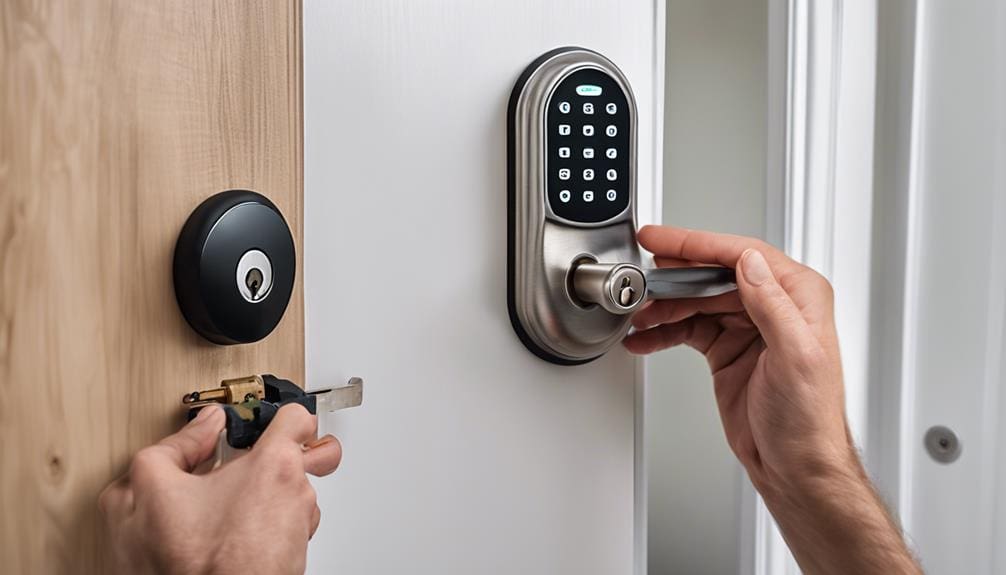
To start the smart lock installation, gather all necessary tools and the smart lock system components. First, you’ll remove the existing lock, ensuring the door is prepared and correctly aligned. Next, set up the new smart lock, making precise wiring connections and programming the system for best performance.
Preparing Your Tools
Securing a smooth installation of your smart lock begins with meticulously preparing your tools, including a screwdriver, drill, and measuring tape. These essential tools will facilitate the smart lock installation by guaranteeing precision and efficiency. Make certain your installation kit is compatible with your existing door hardware to avoid any disruptions.
Follow these steps:
- Gather Your Tools: Collect a screwdriver, drill, and measuring tape.
- Verify Compatibility: Guarantee the installation kit matches your door’s specifications.
- Review Instructions: Read the smart lock manufacturer’s guide thoroughly.
Being precise in this preparatory stage will pave the way for a seamless installation process. By making sure all your tools are ready and compatible, you’ll be well-equipped to install your smart locks effectively.
Setting Up Lock
Start by carefully removing the existing lock from your door using a screwdriver. Make sure you’ve gathered all necessary tools and confirmed compatibility with your smart door lock‘s installation kit. Next, follow this step-by-step guide for installing a smart lock: Position the mounting plate over the existing holes, securing it firmly with provided screws. Attach the digital door lock to the mounting plate, ensuring a snug fit. Connect the smart lock’s battery and test its basic functionality. After physical installation, sync the smart lock with your home’s WiFi or Bluetooth system. The locksmith will assist in setting up entry codes and integrating the smart door lock with other smart devices, enhancing both security and convenience.
Connecting and Configuring
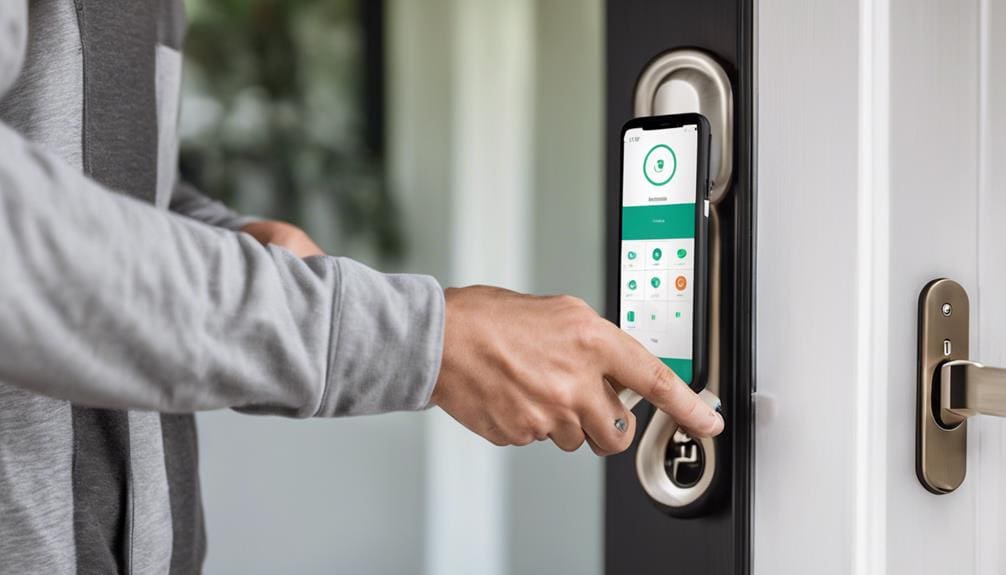
Connecting and configuring your smart lock system, a professional locksmith will guide you through downloading the necessary smartphone app and setting up access codes. With their expertise, you’ll achieve seamless integration of smart locks, enhancing your home’s security and access control. They will confirm your smart lock is connected to WiFi or Bluetooth for remote access. Here’s what you’ll experience:
- App Installation: The locksmith will assist in downloading and installing the appropriate app for your smart lock.
- Access Code Configuration: They will help you set up personalized access codes for different users.
- Connectivity Setup: The locksmith will verify your smart lock is properly connected to your home network or via Bluetooth.
This process guarantees smooth operation and minimizes connectivity issues.
Enhancing Security Features
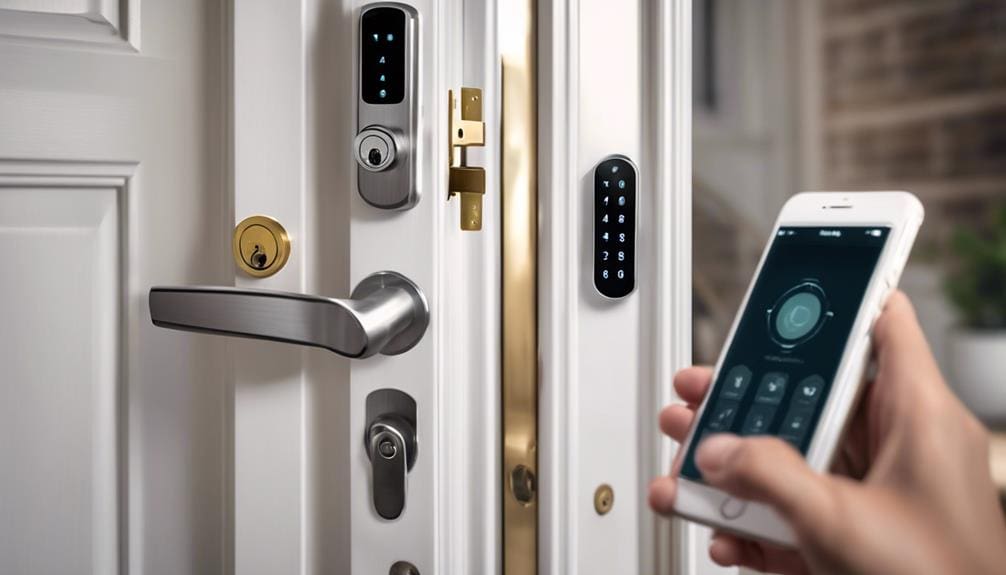
After configuring your smart lock system, a locksmith’s expertise guarantees that the enhanced security features are fully optimized to safeguard your home. By integrating smart locks with your existing security systems, you achieve thorough security that includes encryption, tamper alerts, and biometric authentication. This keyless entry system not only offers convenience but also adds an extra layer of security through remote access control. With activity monitoring and real-time alerts for any suspicious activity, you gain peace of mind knowing your property is protected. Consulting a locksmith ensures proper setup and maintenance, allowing you to benefit from the full range of advanced security features that smart locks offer, thereby boosting the overall protection of your home.
Cost of Installation
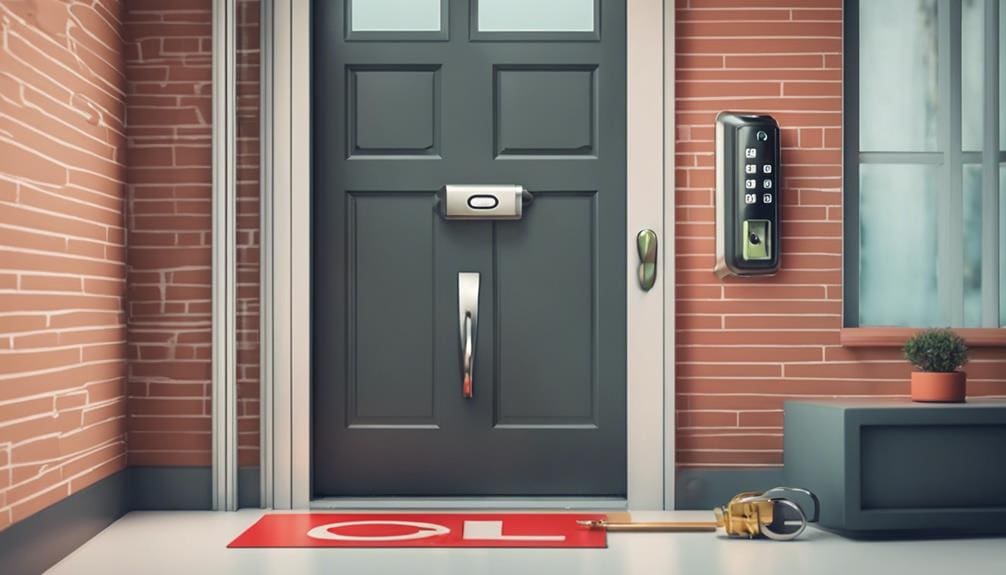
The cost of setting up a smart lock system by a professional locksmith typically ranges from $100 to $200, influenced by factors such as setup complexity, property location, and any additional necessary services. When considering professional smart lock installation, be mindful of these key factors:
- Setup Complexity: More intricate configurations can increase the average cost.
- Property Location: Locksmith installation charges may vary based on your geographical area.
- Additional Services: Alterations to your door or lock, and travel time, can add to the cost of installation.
Opting for professional expertise guarantees your smart lock is correctly and securely installed, providing peace of mind. While DIY might save on labor, professional installation addresses potential issues upfront, ultimately safeguarding your home.
Why Hire a Locksmith
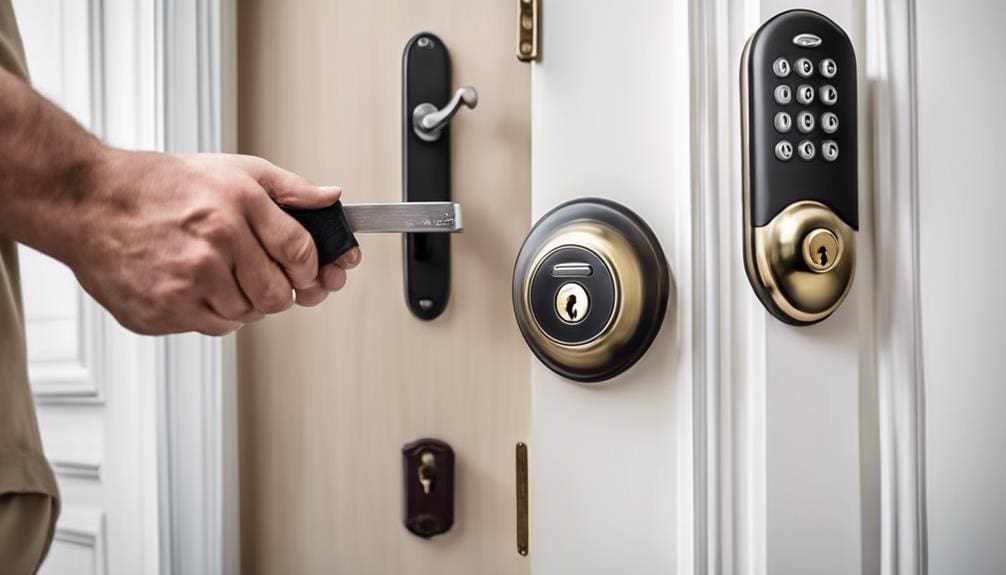
Hiring a professional locksmith for your smart lock installation isn’t just about cost but also guarantees the system’s seamless integration and reliable functionality. Locksmiths possess extensive expertise to assess your security needs and recommend the best smart lock solutions. Their training ensures they can handle various lock types and security systems, minimizing the risk of malfunctions or security vulnerabilities. By opting for a locksmith, you guarantee that your door lock installation is performed correctly, providing peace of mind and reliable security.
| Benefit | Why It Matters | Emotional Impact |
|---|---|---|
| Expertise | Proper installation and integration | Confidence |
| Security Assessment | Tailored smart lock solutions | Peace of Mind |
| Reliability | Minimized malfunctions | Trust |
| Emergency Assistance | Help when needed most | Reassurance |
Locksmiths offer not just service but a commitment to your home’s security.
Frequently Asked Questions
Will a Locksmith Install a Smart Lock?
Will a locksmith install a smart lock? Absolutely. You might wonder if it’s worth it. Here’s the deal: Locksmiths bring specialized expertise to guarantee flawless installation and smooth integration of your smart lock system. They’ll tackle any challenges or compatibility issues that arise, offering you peace of mind. Beyond installation, they provide repairs and maintenance, guaranteeing your smart lock system’s reliability and security. Trust a locksmith for professional, detailed service.
How Much Does It Cost to Install a Smart Lock?
The cost to install a smart lock varies between $100 and $200 professionally. DIY installation can save money but demands precision for security and functionality. Factors like existing door hardware condition and installation complexity affect costs. For example, keypad locks range from $100 to $300, while biometric locks are $300 to $800. Professional locksmiths guarantee proper installation and best security, making them a recommended choice despite the higher cost.
What Are the Disadvantages of Smart Lock System?
When considering smart lock systems, you’ll face challenges like vulnerability to hacking, potential lockouts during power outages, and compatibility issues with existing hardware. Regular maintenance, including battery replacements and software updates, is essential. Additionally, smart locks can be costly upfront. Despite these drawbacks, understanding and addressing them guarantees you can still provide enhanced security and convenience to those you serve.
Can You Install a Smart Lock on a Door Without a Deadbolt?
You can install a smart lock on a door without a deadbolt. In fact, 35% of smart locks are designed for such scenarios. You’ll need alternative mounting methods and possibly additional hardware for proper functionality. Always consider your door’s structure and verify the smart lock model is compatible. Consult with a locksmith or the lock’s manufacturer for precise guidance, confirming a secure and efficient installation.

